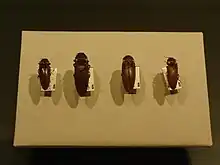| Pyrophorini | |
|---|---|
 | |
| Ignelater luminosus | |
| Scientific classification | |
| Domain: | Eukaryota |
| Kingdom: | Animalia |
| Phylum: | Arthropoda |
| Class: | Insecta |
| Order: | Coleoptera |
| Family: | Elateridae |
| Subfamily: | Agrypninae |
| Tribe: | Pyrophorini Candèze, 1863 |
The Pyrophorini are a New World taxonomic tribe within the Elateridae (click beetle) subfamily Agrypninae.[1] Pyrophorini is a tribe of bioluminescent beetles, and includes such genera as Pyrophorus and Ignelater.
It is believed to be monophyletic.
The tribe Anaissini is very closely related to the Pyrophorini (it includes species formerly placed in Pyrophorini); the latter is exclusively bioluminescent, while the former has only some species that are known to be bioluminescent.[2] Another bioluminescent lineage is Campyloxenus pyrothorax (from Chile) in the related monotypic subfamily Campyloxeninae. The Sinopyrophoridae were thought to represent the first bioluminescent elaterids known from Asia, but actually are a newly-recognized bioluminescent beetle family.[3][4]
Genera
- Cryptolampros Costa, 1975
- Deilelater Costa, 1975
- Fulgeochlizus Costa, 1975
- Hapsodrilus Costa, 1975
- Hifo Candèze, 1882
- Hifoides Schwarz, 1906
- Hypsiophthalmus Latreille, 1834
- Ignelater Costa, 1975
- Lygelater Costa, 1975
- Metapyrophorus Rosa & Costa, 2009
- Noxlumenes Costa, 1975
- Nyctophyxis Costa, 1975
- Opselater Costa, 1975
- Phanophorus Solier, 1851
- Photophorus Candèze, 1863
- Ptesimopsia Costa, 1975
- Pyrearinus Costa, 1975
- Pyrophorus Billberg, 1820
- Pyroptesis Costa, 1975
- Sooporanga Costa, 1975
- Vesperelater Costa, 1975
References
- ↑ Kundrata R, Kubaczkova M, Prosvirov AS, Douglas HB, Fojtikova A, Costa C, Bousquet Y, Alonso-Zarazaga MA, Bouchard P (2019) World catalogue of the genus-group names in Elateridae (Insecta, Coleoptera). Part I: Agrypninae, Campyloxeninae, Hemiopinae, Lissominae, Oestodinae, Parablacinae, Physodactylinae, Pityobiinae, Subprotelaterinae, Tetralobinae. ZooKeys 839: 83–154. https://doi.org/10.3897/zookeys.839.33279
- ↑ Rosa, Simone Policena; Costa, Cleide (2013). "Description of the larva of Alampoides alychnus (Kirsch, 1873), the first known species with bioluminescent immatures in Euplinthini (Elateridae, Agrypninae)". Papéis Avulsos de Zoologia. 53 (22): 301–307. doi:10.1590/S0031-10492013002200001. ISSN 0031-1049.
- ↑ Bi, Wen-Xuan; He, Jin-Wu; Chen, Chang-Chin; Kundrata, Robin; Li, Xue-Yan (2019-07-17). "Sinopyrophorinae, a new subfamily of Elateridae (Coleoptera, Elateroidea) with the first record of a luminous click beetle in Asia and evidence for multiple origins of bioluminescence in Elateridae". ZooKeys. Pensoft Publishers (864): 79–97. doi:10.3897/zookeys.864.26689. ISSN 1313-2970. PMC 6656784. PMID 31363346.
- ↑ Kusy, Dominik; He, Jin‐Wu; Bybee, Seth M.; Motyka, Michal; Bi, Wen‐Xuan; Podsiadlowski, Lars; Li, Xue‐Yan; Bocak, Ladislav (2020-08-25). "Phylogenomic relationships of bioluminescent elateroids define the 'lampyroid' clade with clicking Sinopyrophoridae as its earliest member". Systematic Entomology. Wiley. doi:10.1111/syen.12451. ISSN 0307-6970.
- Costa, Cleide (1975). "Systematics and evolution of the tribes Pyrophorini and Heligmini, with description of Campyloxeninae, new subfamily (Coleoptera, Elateridae)". Arquivos de Zoologia. 26 (2): 49. doi:10.11606/issn.2176-7793.v26i2p49-190.